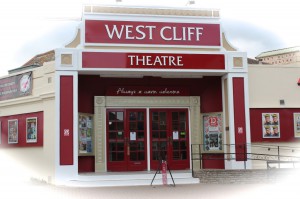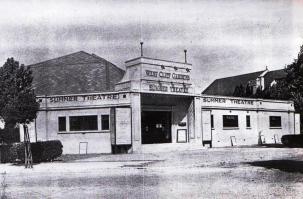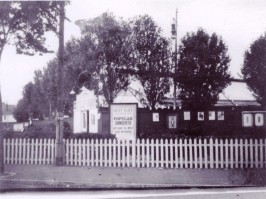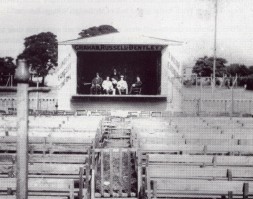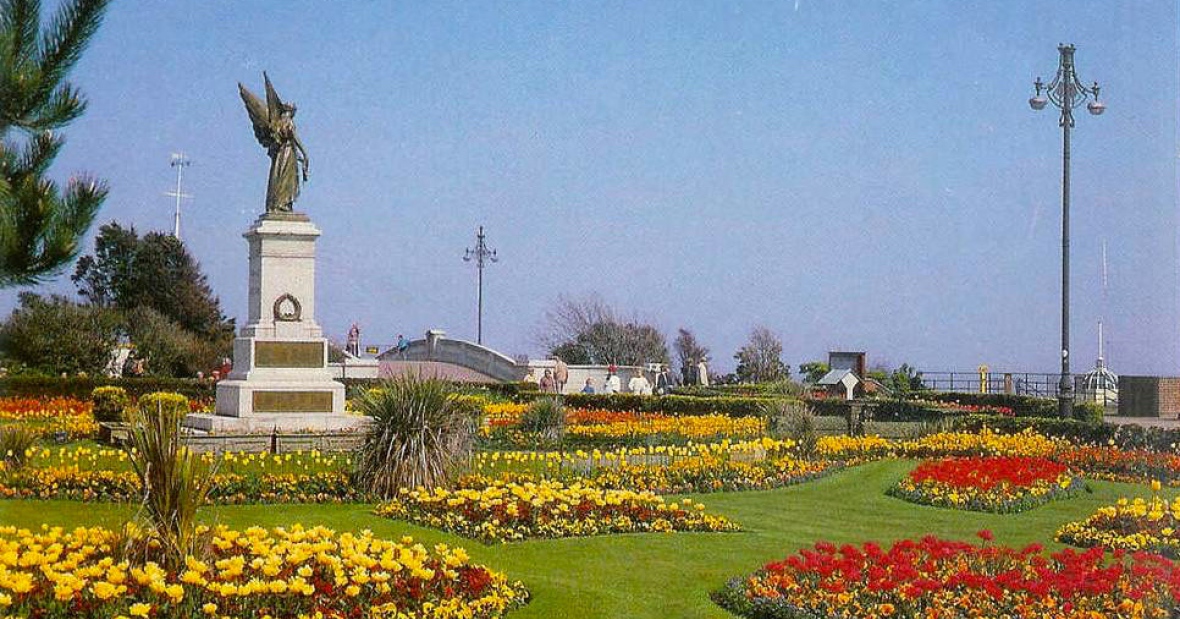
The History of The West Cliff Theatre by Norman Jacobs
The West Cliff Theatre’s origins can be traced back to 1894 when the 21 year old Bert Graham arrived in Clacton with his London Concert Company consisting of himself, his sister Lilian, Bernard Russell, Ted Honeyman and pianist Jack Devo. Their first performances were given on a patch of open ground in Agate Road.
Shows were put on twice during the day with one evening performance under candle light. As they were completely in the open, shows had to be cancelled in bad weather. Even in good weather planks had to be placed across the then unmade roads to enable people to get to the shows. This did not however deter the crowds and it was not uncommon to have upwards of 1000 people, paying twopence a time to sit or stand on the grass listening to Bert Graham’s London Concert Company.
In 1899, after several changes of location and with two new business partners, the London Concert Company of Bert Graham, Bernard Russell and Will Bentley moved to yet another new site, a recreation ground off Tower Road known as the West Cliff Gardens. They were not to move again and the site they chose is the one that still today houses the West Cliff Theatre.
To begin with their shows were still given in the open air. However they soon enclosed the ground with a wooden fence and built a timber and canvas covering so that shows could continue in wet weather though in hot weather the sides were left open to let the fresh air in. Altogether this make-shift hall seated 1000.
At this time the company only performed during the Summer Season with special one off concerts on Sundays. For example in 1906, Mr Kit Keen “of the London Pavilion, bone soloist” appeared as did Mr Harrison Walker a “baritone from the Queen’s Hall in London.”
Tragedy struck the company in 1910, when Bernard Russell died at his parents’ home in Camden Town, London, at the age of 34. He had been married for just two years and left a baby son only a few weeks old.
Following Bernard Russell’s death, Graham and Bentley continued to put on their shows under the heading of Graham and Bentley’s Concert Party. From 1912 to 1914 they employed a young singer in their company billed as a “romantic baritone”. His name was Stanley Holloway and he was paid three and a half guineas per week in 1912, four guineas in 1913 and four and a half guineas in 1914.
The next big step forward came in 1928 when Messrs Graham and Bentley opened a brand new 800 seat theatre with outside toilets on the site, designed by Mr G.W. Gould, architect, of Station Road, Clacton and built by local builders, Canler and Sons.
The new theatre, called the West Cliff Gardens Theatre, was officially opened on 25 May 1928 by local M.P., Sir Frederick Rice. Although there have been a number of significant changes made to the theatre since then, it is basically still the same building that patrons enter today. In recognition of this fact and in honour of its founders, the letters “G” and “B” (for Graham and Bentley) can still be seen picked out above the proscenium arch.
The pattern of Summer Season with guest artistes on Sundays remained the mainstay of the theatre until 1930, when, for the first time, a show was put on out of season as the Clacton Amateur Operatic Society staged The Pirates of Penzance from Tuesday 18 March to Saturday 22 March.
Throughout the 1920s and early 30s, Will Bentley was trying to cope with running two successful businesses. As well as the West Cliff Theatre, he also ran a thriving Oyster Restaurant in Piccadilly in the heart of London. Every day he caught the early morning commuter train up to town, returning on the evening train just in time to change and go on at the West Cliff. By the time 1934 came around he had decided to concentrate on his oyster business.
To begin the 1934 season Graham and Bentley put on a show called Will Hammer’s Entertainers. Shortly afterwards, in April 1934, in line with Will Bentley’s wishes, the pair of them put the West Cliff up for sale by auction and the theatre was sold to the same Will Hammer whose show they had begun the season by producing. Will Hammer, a theatrical agent, whose real name was William Hinds, already owned several theatres around the coast, including one at Felixstowe, as well as a large number of jewellery stores, hairdressing salons and bicycle shops.
In the same year that he bought the West Cliff, Will Hammer founded a film company called Hammer Productions Ltd. with himself as Chairman. This was later destined to achieve world wide fame as the Hammer House of Horror.
Will Hammer’s first innovation at the West Cliff was to keep the theatre open all the year round with a mixture of variety, concert parties, pantomime and repertory companies. And although it was still the Summer Season which provided the theatre’s bread and butter he was able to attract a number of the top stars of the thirties to the West Cliff for one-off shows, including Bennett & Williams, Albert Whelan, Harry Tate and Robb Wilton.
In common with all other theatres in the country, the West Cliff closed on the 2 September 1939 owing to the imminent threat of the Second World War, though it did re-open later on during the War to stage a number of ENSA shows for the thousands of troops then billeted in Clacton.
Will Hammer re-opened the Summer Season at the West Cliff in 1945 with a show called Victory Vanities while in 1947 Nosmo King starred in For the Fun of It with a young up-and-coming comedian having his first-ever summer season, one Frankie Howerd.
Hammer continued to produce his annual summer revue until his death following a cycling accident in 1957. By the time of Hammer’s death, the theatre, now nearly 30 years old, was falling into a state of disrepair and was beginning to look rather the worse for wear. With audiences generally beginning to drop off, due in some measure to the influence of television, it began to look doubtful if a buyer with the necessary capital to invest would be found to buy the theatre.
Councillor Jo St. Clair, a leading light in the Clacton Amateur Dramatic Society led a campaign to get Clacton Urban District Council itself to buy the Theatre. There was a great deal of opposition from other councillors who proposed that the Theatre should be demolished and a block of flats built in its place. Following an exciting debate in full Council, the move to purchase the Theatre was carried by a single vote. The cost to the Council was £7000 for the Theatre plus £750 for fixtures and fittings.
With the Council now in charge, a decision was made to stop putting on the traditional Summer Variety show as there were already a number of other shows of this type in Clacton. And so, in an attempt to appeal to a different kind of audience, it was decided to put on a repertory season in 1960.
This proved to be so successful that the repertory seasons were continued for several years. In 1966 for example, a Brian Rix presentation took place when One for the Pot alternated with Wanted – One Body for the summer season. These plays starred Jerry Desmonde, George Moon and Bill Treacher (Arthur Fowler in television’s Eastenders).
With other theatres in the town closing during the 1960s, the West Cliff returned to Variety in 1967 with Bunny Baron being asked to produce the summer season. This he did with a show entitled Starnite Spectacular, starring Don MacLean.
With audiences dropping year on year Baron decided to bring in a top name star in an attempt to win back the numbers and so, in 1972, he signed up Tommy Trinder, but even he failed to draw the crowds and the whole future of the West Cliff was once again in the balance, with calls being made in the local press for the theatre to be demolished and the money saved spent on a marina or dry ski slope.
However, the Council decided to keep faith with the idea of live theatrical entertainment and appointed Francis Golightly to produce the Summer Show. Francis breathed new life in to the Theatre with shows such as Showtime, Holiday Startime and, perhaps best remembered of all, Cascade Revue. Some of the names who appeared in Golightly’s time included not only established stars like Kenny Cantor, Billy Dainty, Rosemary Squires, Don Maclean, Norman Collier and Bernie Clifton, but he was also responsible for discovering some of Britain’s brightest young entertainers and giving them their first taste of success at the West Cliff. Names in this category include Ruthie Henshall, Gary Willmot and Alex Bourne.
Although the Summer Show was flourishing there was once again little other activity at the theatre during the rest of the year and what there was were mainly amateur productions and so, by the early 80s, there were murmurings in the press and elsewhere that the Council were spending too much ratepayers’ money on keeping open a theatre that was essentially only used for twelve weeks of the year and there was a very real possibility that Tendring District Council (TDC), the successor to Clacton Urban District Council, might pull the plug on its funding thereby effectively closing the theatre. In view of this threat, two prominent members of CAOS, Mike Freeman and Peter Anselmi, decided to form a group to rally public opinion and to put pressure on the council to continue to support the West Cliff.
And so the Tendring Theatre Association (TTA) was formed from local theatre users and business people. The TTA then approached Tendring District Council with plans for making use of the theatre all year round and for the Association itself to become more involved with the day-to-day running of the theatre. Following a detailed submission of their plans to the Council, it was agreed by TDC that the Association be asked to form a Trust jointly with the Council (six members from the TTA and three from the Council) to take over the running of the Theatre outside the Summer Season
With this agreement, the Theatre once again became a full-time all-year round venue with many different types of shows being staged. Indeed, so much activity was now taking place the time had come to employ a professional full-time administrator and Adrian Towler was appointed to the post in 1989.
After nearly ten years of showing that it could run the West Cliff as a successful all year round theatre and arts centre, the Trust contacted the Council with a view to buying the freehold of the theatre outright. This was agreed and in 1995, the West Cliff (Tendring) Trust became the new freeholders although the agreement included the stipulation that Francis Golightly would continue to produce the Summer Season on behalf of Tendring District Council until 2001. From 2002 the Trustees became responsible for all aspects of the Theatre including putting on the Summer Show. Since then a number of different producers had been responsible for putting on the Summer Season, including John Warwick, Chris Gidney and Michael Wooldridge. In 2016, for the first time since 1952, the Theatre itself produced the show in co-operation with AJL Theatricals.
During the rest of the year, the West Cliff plays host to many different forms of entertainment from children’s shows and local amateur societies to some of the top names in show
business.
As the West Cliff Theatre now celebrates nearly 90 years in its present building and almost 120 years in Clacton it is with some pride that the Trust can point to its continuing success. In all, the
West Cliff Theatre is in use for over 300 days a year, something that the founders Bert Graham, Bernard Russell and Will Bentley would have considered a flight of fancy. But, no doubt, if the three
men were able to come back today, they would be very proud to see what has become of their creation and to see the massive part it now plays in the lives of all who live in Clacton, the wider
Tendring area. and increasingly so throughout the whole of Essex.

